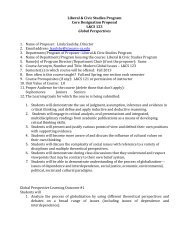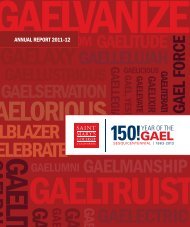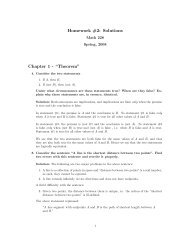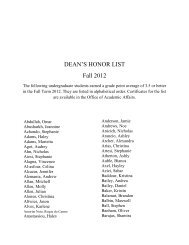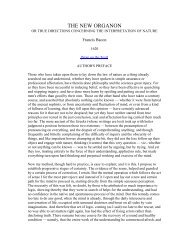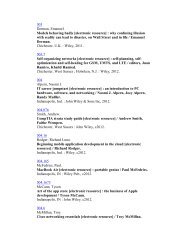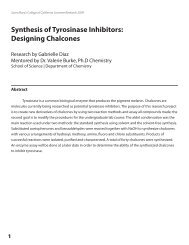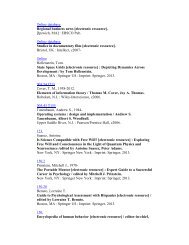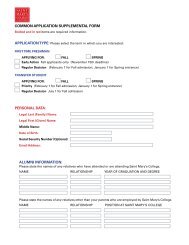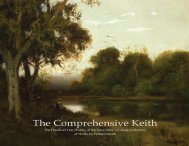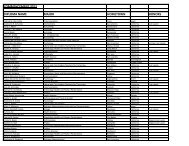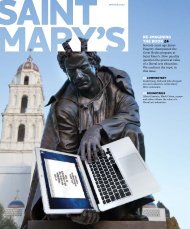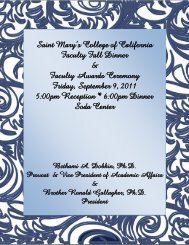2008-09 Catalog - Saint Mary's College of California
2008-09 Catalog - Saint Mary's College of California
2008-09 Catalog - Saint Mary's College of California
You also want an ePaper? Increase the reach of your titles
YUMPU automatically turns print PDFs into web optimized ePapers that Google loves.
Curriculum Biology40 Introductory MicrobiologyThe biology <strong>of</strong> microorganisms including bacteria, viruses, and fungi, withemphasis on those forms <strong>of</strong> medical importance to man. Three hours <strong>of</strong>lecture per week. Must be concurrently enrolled in Biology 41.41 Introductory Microbiology LaboratoryLaboratory to accompany Biology 40. Includes techniques for culture,isolation, characterization, and identification <strong>of</strong> microorganisms. One labper week for three hours. Must be concurrently enrolled in Biology 40.Laboratory fee $175.50 General BiologyA one semester introduction to the basic principles and concepts <strong>of</strong>biological science. Designed for students not majoring in biology. Threehours <strong>of</strong> lecture per week. Must be concurrently enrolled in Biology 51.Fulfills Area B requirement,51 General Biology LaboratoryLaboratory to accompany Biology 50. One lab per week for three hours.Must be concurrently enrolled in Biology 50. Laboratory fee $175.52 The Symbiotic UniverseAn interdisciplinary science course which in addition to inter-sciencesyntheses forges into areas <strong>of</strong> theology, philosophy, the social sciences,and the nature <strong>of</strong> good and evil. It is designed for both non-science andscience majors, and fulfills an Area B requirement. The course exploresoriginal ideas concerning the role played by symbiosis in the origin <strong>of</strong>the universe, the earth, and life on earth, and in the development <strong>of</strong>the earth’s ecosystems. It argues that phases <strong>of</strong> creation are organizedaround the principles <strong>of</strong> symbiotic mutualism. It suggests that such cooperationis dictated by the laws <strong>of</strong> physics and therefore was establishedat the moment <strong>of</strong> creation. This universal thread <strong>of</strong> symbiosis is evidentin the formation <strong>of</strong> atoms, elements and matter, chemical interactions,star and planetary systems, and simple to complex life forms. It drivesevolution from the primordial soup to cells, multicellular organisms,populations, communities and ecosystems, and human societies as well.One lab per week for three hours. Laboratory fee $175.55 Ocean WorldAn introductory course that examines the ocean world and its inhabitants.Topics include physical and chemical properties <strong>of</strong> sea water; tidesand currents; geological principles; coastal and open ocean habitats; lifein planktonic and benthic communities; coral reef, hydrothermal vent andmangrove ecosystems. Three hours <strong>of</strong> lecture per week. One lab perweek for three hours. Fills Area B requirement. Laboratory fee $175.80 Human BiologyThis is a course to connect basic biology concepts using the human as anillustrative example. Basic scientific processes and the concepts <strong>of</strong> humanbiology will be explored through lecture and laboratory exercises. Topicswill include science and society, the chemistry <strong>of</strong> living things, structureand function <strong>of</strong> cells, genetics, anatomy and physiology <strong>of</strong> the organsystems, reproduction, cancer, aging, evolution, human impacts, andenvironmental issues. Open to all students interested in discovering thescientific process and the concepts <strong>of</strong> human biology. One three-hourlab per week. Fills Area B requirement.81 Human Biology LaboratoryLaboratory to accompany Biology 80. One lab per week for three hours.Must be concurrently enrolled in Biology 80. Laboratory fee $175.88 Biology <strong>of</strong> WomenBiology <strong>of</strong> Women is an introduction to the structure, physiology, andgenetics <strong>of</strong> women across the life span. The first half <strong>of</strong> the course willexplore the genetic, hormonal, and developmental basis <strong>of</strong> gender. Wewill study physiology and development from conception, through puberty,pregnancy, and aging. The latter part <strong>of</strong> the course will deal with specifichealth concerns <strong>of</strong> women and focus on predominantly or uniquelygender-related illnesses and their physiologic basis. The laboratory isintended to demonstrate the varied processes <strong>of</strong> science and the scientificmethod using women’s biology as the basic subject material. Opento men and women. Fulfills area B requirement. Laboratory fee $175.89 Biology <strong>of</strong> Women LaboratoryLaboratory to accompany Biology 88. One lab per week for three hours.Must be concurrently enrolled in Biology 88. Laboratory fee $175.Upper DivisionEach upper-division course has prerequisites <strong>of</strong> Biology 1, 1L and 2, 2Lwith a grade <strong>of</strong> C– or better in each <strong>of</strong> these prerequisites.100 Comparative AnatomyThe course examines vertebrate form and function through the topics<strong>of</strong> vertebrate evolution, functional morphology, and development, alongwith the study <strong>of</strong> s<strong>of</strong>t tissues, organ systems, and skin. Three lecturehours and two labs per week. Laboratory fee $175.Offered in alternate years. Prerequisites: Biology 1, 1L and Biology 2, 2L.102 Developmental Biology and EmbryologyExplores the processes and patterns <strong>of</strong> fertilization and embryonicdevelopment <strong>of</strong> animals with an emphasis on mechanisms controlling celldifferentiation and morphogenesis. Three lecture hours and one lab perweek. Prerequisites: Biology 1, 1L and Biology 2, 2L and Chemistry 104,106. Laboratory fee $175.Offered in alternate years.105 GeneticsPrinciples <strong>of</strong> biological inheritance in animals, plants, and including someconsideration <strong>of</strong> classical, molecular, population and human genetics.Three hours per week <strong>of</strong> lecture and one lab per week for four hours.Prerequisites: Biology 1, 1L and Biology 2, 2L. Laboratory fee $175.110 Parasitism and SymbiologyA comprehensive course in parasitology, focusing on the many facets <strong>of</strong>symbiosis common to every level <strong>of</strong> biology. It embraces the three basictypes <strong>of</strong> intimate interrelationship between different species <strong>of</strong> organisms:parasitism, mutualism and commensalism. This course examinesan array <strong>of</strong> interactions in all three types <strong>of</strong> interrelationships, at manylevels <strong>of</strong> interdependency. All five kingdoms, from bacteria, protozoa,and fungi to plants and animals, are studied. Three lecture hours and onelab per week. Prerequisites: Biology 1, 1L and Biology 2, 2L. Laboratoryfee $175.Offered in alternate years.64



